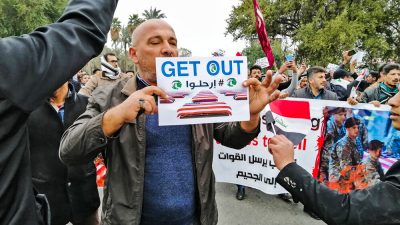Trump Administration in “Historic” Withdrawal of Troops from 3 Iraq Bases Amid Ongoing Rocket Attacks

AFP is reporting that the US military is withdrawing US troops from 3 Iraqi bases. They are al-Qa’im in the far north on the Syrian border, Qayyarah near Mosul, and Kirkuk.
AFP quotes Coalition spokesman Operation Inherent Resolve spokesman Col. Myles B. Caggins III as saying “A transfer ceremony is taking place today to hand over the facilities to Iraqi forces, and the intent is that all coalition troops will be leaving Qaim … It’s historic.”
The Coalition tweeted,
Today, the @coalition transferred Al Qa'im base to #ISF
Because of 🇮🇶 success in the fight against ISIS, in conjunction with partner forces and the Government of Iraq, CJTF-OIR will relocate and consolidate personnel and equipment from several Iraqi bases throughout 2020. pic.twitter.com/FO754mO5yx
— Inherent Resolve (@CJTFOIR) March 17, 2020
Although the US-led coalition portrayed this withdrawal as coming upon the completion of a mission, in fact ISIL operatives are still active in northern Iraq, and Qa’im is a key transit point to Syria.
The actual reason is that the base at al-Qa’im and the one at Kirkuk have come under rocket fire in recent months. The US Department of Defense believes that they have been attacked by the Kata’ib Hizbullah (Brigades of the Party of God), a Shiite militia. In late December, US fighter jets abruptly attacked a Kata’ib Hizbullah base at al-Qa’im, killing two dozen fighters. Then on Jan. 3, Trump had the leader of the group assassinated, along with Iranian Gen. Qasem Soleimani.
I can guarantee you that the Shiite militiamen are celebrating today, that the US is out of al-Qa’im and they are not.
There is still a small contingent of US troops in southeast Syria, which Trump was persuaded to keep there to “take the oil” (they aren’t actually taking any oil). The withdrawal from al-Qa’im leaves that base in Syria more isolated than ever. A few of the US troops who left al-Qa’im on Tuesday will be sent to Syria, while others will go to other, less exposed bases in Iraq, and some will come home to the United States.
Col. Caggins called this move historic because if we read between the lines, it is the beginning of the Second Great US Withdrawal from Iraq, the first having come in 2011.
Last week on Wednesday, two American servicemen (Gunnery Sgt. Diego Pogo and Capt. Moises Navas) and one British servicewoman were killed and several more Coalition personnel were wounded in rocket attacks on al-Taji Base north of Baghdad, attacks in which the Shiite Kata’ib Hizbullah militia was suspected. The US Air Force hit an Iraqi base at Jurf al-Sakhr in the south in retaliation on Friday, killing five Iraqi soldiers and one civilian, apparently unaware that the Kata’ib Hizbullah militiamen had departed that base some time ago. On Saturday, al-Taji took more rocket fire, with three US servicemen wounded, two seriously. Alarmed, the Iraqi officers in the anti-ISIL Joint Operations Command urgently called for a US withdrawal from the country. They were echoing the Iraqi parliament, which mandated such a withdrawal in January. On Tuesday, rockets slammed into the Green Zone near the US Embassy. The US command denied reports that al-Taji was hit again.
The Qayyarah Airfield West was recaptured from ISIL in 2016 and about 500 servicemen from the 1101st Airborne Division were based there during the reconquest of Mosul.
Attacks on US personnel at the Kirkuk base kicked off the tensions and violence between Iraqis and the United States. Last fall, one such attack killed a civilian American contractor. Trump blamed Kata’ib Hizbullah, but the Iraqi military believes that this was an error and that the attacks were carried out by ISIL.
The Kata’ib Hizbullah and other Shiite militias were recognized by the Iraqi parliament in 2018 as a sort of National Guard and integrated into the Iraqi military. Trump therefore attacked an element of the Iraqi Army when he bombed KH bases at al-Qa’im in December and killed the KH head in January 3. The militias are also political parties and their coalition, Fath, has 40 seats in parliament, making them a force to reckon with. They had given the Iraqi government a respite to expel the US troops, but said that they would take matters into their own hands if the government did not act.
Action has been postponed by gridlock in Baghdad, with mass rallies having forced PM Adel Abdelmahdi to resign last fall, but with a succession of potential prime ministers failing to gain the acceptance of both ongoing street crowds and the political elite.
On Tuesday, Adnan al-Zurfi was put forward without consultation by president Barham Salih, a pro-American Iraqi of Kurdish heritage. Al-Zurfi had been named governor of Najaf by US viceroy Paul Bremer in 2003, and his close ties to the US make it unlikely that the Shiite dominated parliament will accept him. It is unclear if the youth street crowds, who want less foreign influence in Iraq, will have a vote on al-Zurfi, since the coronavirus threat may disperse them and sap their energy.
The protection of allied foreign troops in a country is the responsibility of the host government and its military. Since Trump started a feud with a part of the Iraqi military, it seems a little unlikely that the host can fulfill its obligations, and I suspect that the rest of the US troops will follow those at al-Qa’im who departed for home on Tuesday.
*
Note to readers: please click the share buttons above or below. Forward this article to your email lists. Crosspost on your blog site, internet forums. etc.
Featured image: Protesters take to the streets of the Iraqi capital, Baghdad, for a million-man rally to call for an end to the military presence of the United States in their country. Photo | Mehr

